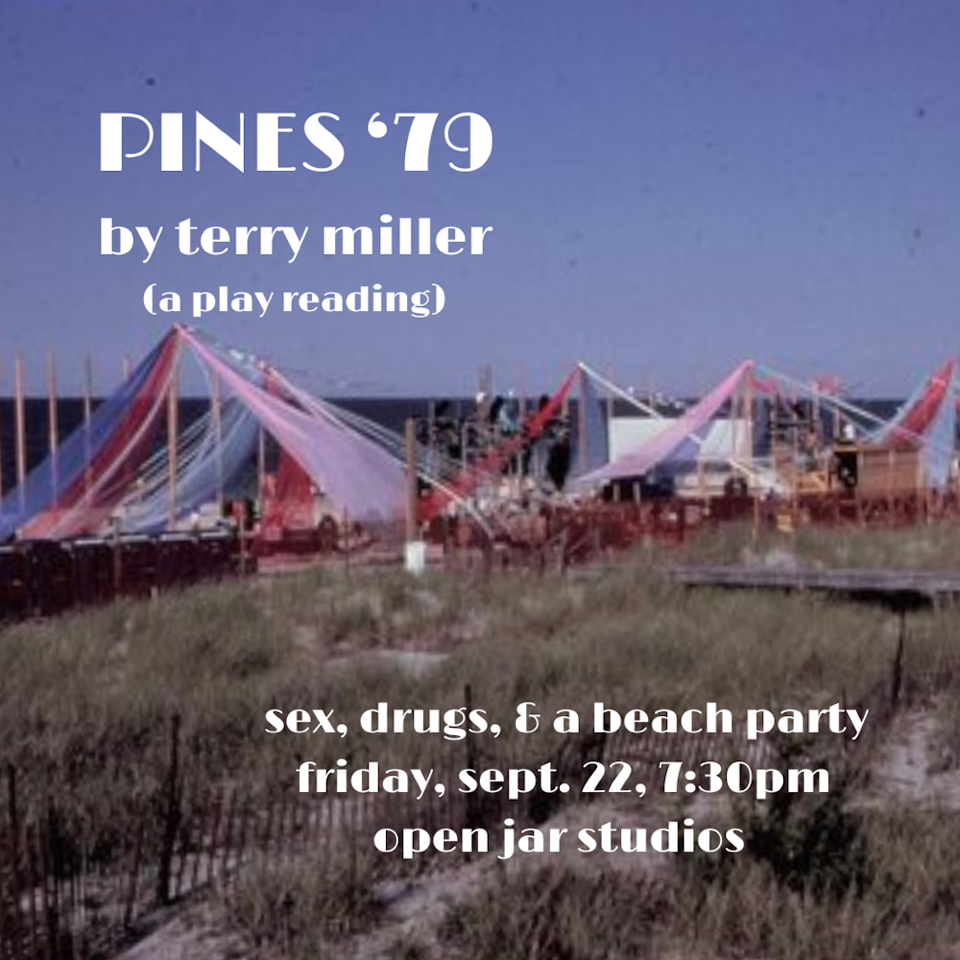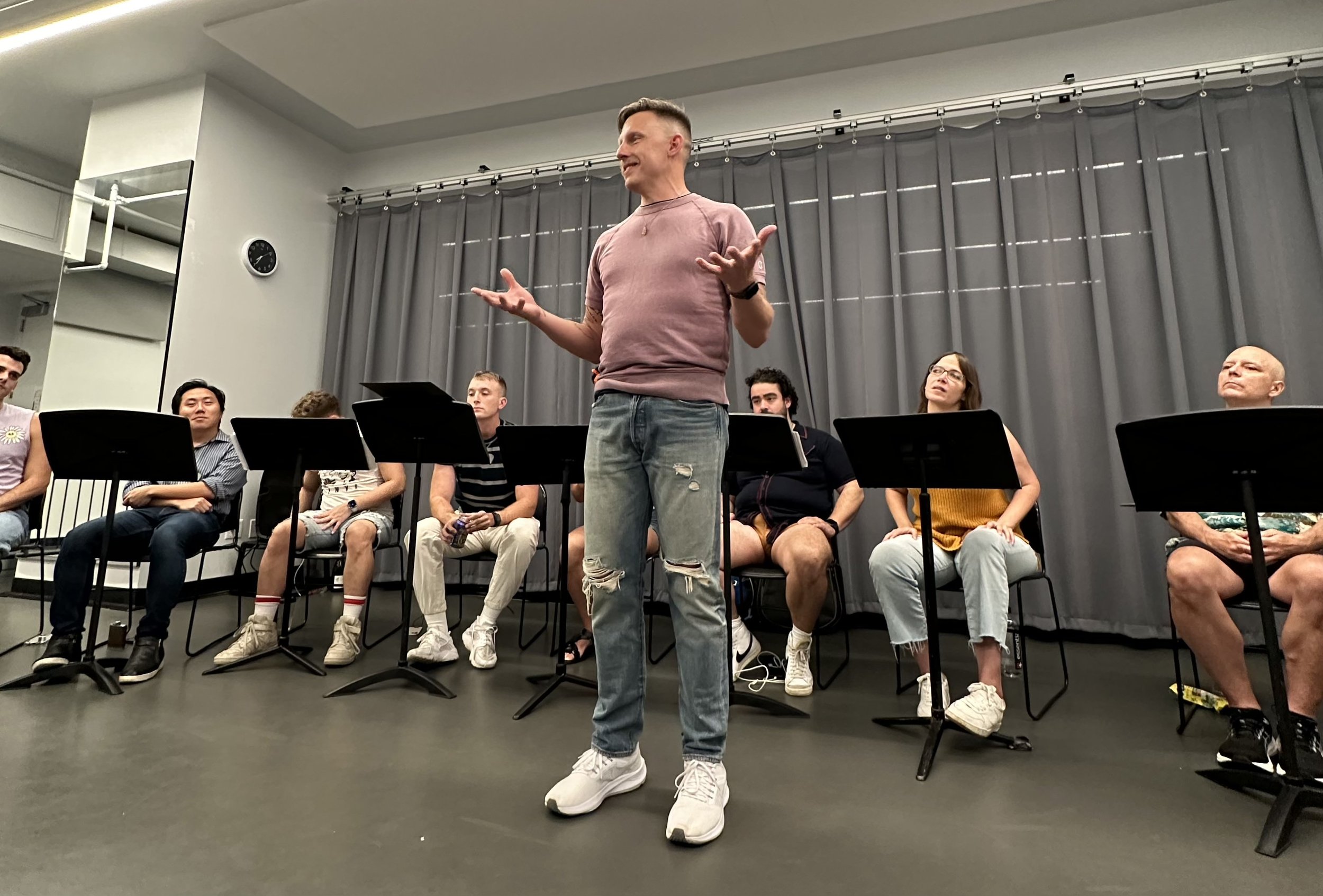Staging Terry Miller’s 1981 play, PINES ‘79, in 2023
Producer and Director David Baldwin & the 2023 cast of PINES ‘79
Guest Writer: David Baldwin, October 2023
In September 2023, as part of my monthly LGBTQ Play Reading Series, I produced and directed a reading of Terry Miller’s 1981 play, PINES' ‘79. Set in the first summer of The Beach Party (now known as “Pines Party”), the play follows one share house through the summer, with 5 scenes set in May, June, July, August, and September.
The original script of PINES ‘79
Characters
Though the characters were created in the late 70’s/early 80’s, Terry Miller was certainly just observing what he saw in the Pines and drawing up these archetypes. John, the owner of the house, deals drugs. “I’m an Entertainment Consultant. At least, that’s what it says on my tax returns.” He hovers around the phone, waiting for customers to call. It being 1979, he is, of course, reliant on a landline.
Brace, the “Stud,” is always running off on a “date” (we might call them hookups), and enters each scene dressed head to toe in an archetypal costume, many of them recognizable as Village People. Brace brings Jeff, “the Innocent,” to share his room. They work together in the city, and by the end of the summer, Jeff too (who started out not drinking or doing any drugs, not even weed) is drinking, smoking “grass,” and whoring around the island just like his roommate/mentor, who is now staying in to read instead of going out!
Hank & Curt in the original production of PINES ‘79
Conflict
The central emotional conflict of PINES ‘79 centers around “The Lovers,” Curt and Hank, who are in their honeymoon phase when the play opens in May. We hear them having sex in their bedroom offstage. “Every time I turn around, they’re at it again. A pair of damn newlyweds,” John complains to Brace.
Curt, a handsome and relatively wealthy architect (he designed the Pines house in which the play is set,) is ready for love and monogamy with Hank, who is insecure, overweight, poor (Curt paid for his share), and unwilling to say “I love you.” Hank can’t see why Curt is into him, and having been hurt in the past, doesn’t want to get hurt again. He wants to “keep it loose,” assuming that Curt will tire of him soon.
Their conflict builds over the summer, and really explodes when Hank, who has a thing for tall blonde men, brings one back to the house and has sex with him in their bedroom. Couples navigating an open relationship?! Surely, nothing like that goes on in the Pines today?
Hank & Curt singing a song together in the 2023 staged reading of PINES ‘79
Insights
Perhaps one of the most intriguing characters is the neighbor Brenda, a former Broadway chorus girl who eventually tells us that her son committed suicide. Brenda sees a lot of her son in Hank and tries to give him some of the affection and acceptance that she wishes she had given her son. She says:
“He left me a note. He said he couldn’t live with the idea of disappointing me, of not being the perfect son. He didn’t think I would understand his true feelings. Of course, that was 1958. Attitudes were different then. I was different then. Maybe I would have understood. Two years later, I divorced my husband. Ever since then, I have tried to understand. Maybe that’s why I’m out here each summer. I don’t know. Maybe it’s penance. As far as Hank is concerned…well…I was using him to cover up my mistakes.”
Ward, Greg, & Muriel in A PERFECT RELATIONSHIP
Doric Wilson’s 1983 play, A PERFECT RELATIONSHIP
In Brenda, I found a parallel to the play that I directed for our Series in August, Doric Wilson’s 1983 A PERFECT RELATIONSHIP. In this play, an older woman “Muriel,” speaks to “The Lovers,” roommates Ward and Greg, and encourages them to explore the connection that they have with each other, though they’ve never had sex. Muriel, who describes herself as “a loner with a fairly voracious sexual appetite,” tells Ward and Greg:
“Break up, see if I care. It does seem silly to throw away all the years of hard work-and from what I've seen of the two of you, it must have been laborious… That’s the great thing about this country, every one of us has the constitutional right to be stupid. Why do you think I always bring my boyfriends here? To teach them an object lesson in survival. I used to get such a hoot watching two people with nothing going for them–as it turns out, not even sex–two people dealing with each other–lies and all…but you two even seem to deal with that. I used to say to myself, if and when you finally become bored with the lies and the games and the "convincing" and all the other shit, you'd take a hard look at each other and discover you're on the way to a perfect relationship.”
The cast of the 2023 staged reading of A PERFECT RELATIONSHIP
Parallels
It’s obvious to audiences that Ward and Greg in A PERFECT RELATIONSHIP and Curt and Hank in PINES ‘79 are in love, though they have their guards up. I found it interesting that in both of these plays, the playwright put the encouragement to the couple in the mouth of an older woman, perhaps a mother figure? To Brenda, Terry Miller gives a chance for redemption for her perceived failure as a mother. But these are “cool moms.” Both characters are sexually active and openly joke about their promiscuity. Brenda says, “If you can’t fuck your friends, who can you fuck?”
Terry Miller’s obituary
Connection
Several years ago, I started reading a lot of gay plays, and exploring what gay playwrights were trying to say to us. (Many of these playwrights’ careers were cut short by the AIDS crisis, including Terry Miller.) Long before Brené Brown’s famed TedTalk on “Vulnerability,” gay playwrights were urging us to tear down our defenses and really connect with each other. As Brenda says to Hank:
“You're not alone…I don't know who’s right and who's wrong, but it doesn't matter. Because we all interlock like a jigsaw puzzle, needing and supporting. Hank, you remind me so of someone. I was sitting here, thinking about him. He needed affection…support. Very much. But he was insecure. Afraid. Not of being denied affection, but of what would happen if he got it. Anyone who was capable of giving him what he needed, he wouldn't trust. He kept them at arm's length, with words. Barriers won't prevent you from being hurt. Nothing can. Holding back guarantees you only one thing: that nothing will happen. You have to open up. You have to take a chance.”
The full cast of the 2023 staged reading of PINES ‘79
Join us!
If you’re interested in attending our monthly LGBTQ Play Reading Series, you can follow me on Instagram, where I always post the details! On October 20, we’ll be reading 3 short plays by Robert Patrick.













